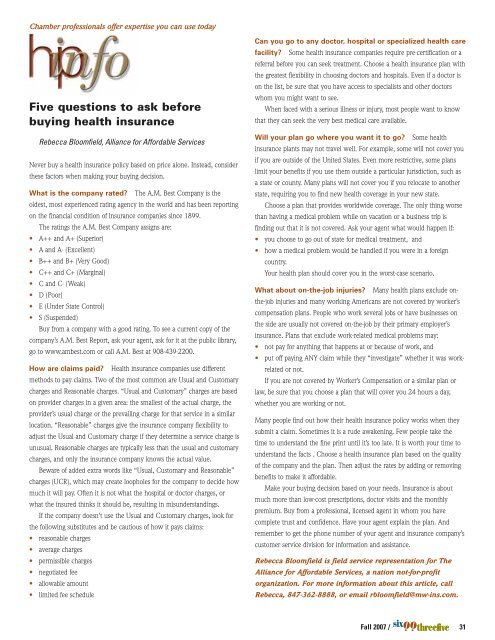PHOTOS: Matt Boltz, Engineer, Chicago Cubs Radio - Wordspecs
PHOTOS: Matt Boltz, Engineer, Chicago Cubs Radio - Wordspecs
PHOTOS: Matt Boltz, Engineer, Chicago Cubs Radio - Wordspecs
You also want an ePaper? Increase the reach of your titles
YUMPU automatically turns print PDFs into web optimized ePapers that Google loves.
Chamber professionals offer expertise you can use today<br />
Five questions to ask before<br />
buying health insurance<br />
Rebecca Bloomfield, Alliance for Affordable Services<br />
Never buy a health insurance policy based on price alone. Instead, consider<br />
these factors when making your buying decision.<br />
What is the company rated The A.M. Best Company is the<br />
oldest, most experienced rating agency in the world and has been reporting<br />
on the financial condition of insurance companies since 1899.<br />
The ratings the A.M. Best Company assigns are:<br />
• A++ and A+ (Superior)<br />
• A and A- (Excellent)<br />
• B++ and B+ (Very Good)<br />
• C++ and C+ (Marginal)<br />
• C and C- (Weak)<br />
• D (Poor)<br />
• E (Under State Control)<br />
• S (Suspended)<br />
Buy from a company with a good rating. To see a current copy of the<br />
company’s A.M. Best Report, ask your agent, ask for it at the public library,<br />
go to www.ambest.com or call A.M. Best at 908-439-2200.<br />
How are claims paid Health insurance companies use different<br />
methods to pay claims. Two of the most common are Usual and Customary<br />
charges and Reasonable charges. “Usual and Customary” charges are based<br />
on provider charges in a given area: the smallest of the actual charge, the<br />
provider’s usual charge or the prevailing charge for that service in a similar<br />
location. “Reasonable” charges give the insurance company flexibility to<br />
adjust the Usual and Customary charge if they determine a service charge is<br />
unusual. Reasonable charges are typically less than the usual and customary<br />
charges, and only the insurance company knows the actual value.<br />
Beware of added extra words like “Usual, Customary and Reasonable”<br />
charges (UCR), which may create loopholes for the company to decide how<br />
much it will pay. Often it is not what the hospital or doctor charges, or<br />
what the insured thinks it should be, resulting in misunderstandings.<br />
If the company doesn’t use the Usual and Customary charges, look for<br />
the following substitutes and be cautious of how it pays claims:<br />
• reasonable charges<br />
• average charges<br />
• permissible charges<br />
• negotiated fee<br />
• allowable amount<br />
• limited fee schedule<br />
Can you go to any doctor, hospital or specialized health care<br />
facility Some health insurance companies require pre-certification or a<br />
referral before you can seek treatment. Choose a health insurance plan with<br />
the greatest flexibility in choosing doctors and hospitals. Even if a doctor is<br />
on the list, be sure that you have access to specialists and other doctors<br />
whom you might want to see.<br />
When faced with a serious illness or injury, most people want to know<br />
that they can seek the very best medical care available.<br />
Will your plan go where you want it to go Some health<br />
insurance plants may not travel well. For example, some will not cover you<br />
if you are outside of the United States. Even more restrictive, some plans<br />
limit your benefits if you use them outside a particular jurisdiction, such as<br />
a state or county. Many plans will not cover you if you relocate to another<br />
state, requiring you to find new health coverage in your new state.<br />
Choose a plan that provides worldwide coverage. The only thing worse<br />
than having a medical problem while on vacation or a business trip is<br />
finding out that it is not covered. Ask your agent what would happen if:<br />
• you choose to go out of state for medical treatment, and<br />
• how a medical problem would be handled if you were in a foreign<br />
country.<br />
Your health plan should cover you in the worst-case scenario.<br />
What about on-the-job injuries Many health plans exclude onthe-job<br />
injuries and many working Americans are not covered by worker’s<br />
compensation plans. People who work several jobs or have businesses on<br />
the side are usually not covered on-the-job by their primary employer’s<br />
insurance. Plans that exclude work-related medical problems may:<br />
• not pay for anything that happens at or because of work, and<br />
• put off paying ANY claim while they “investigate” whether it was workrelated<br />
or not.<br />
If you are not covered by Worker’s Compensation or a similar plan or<br />
law, be sure that you choose a plan that will cover you 24 hours a day,<br />
whether you are working or not.<br />
Many people find out how their health insurance policy works when they<br />
submit a claim. Sometimes it is a rude awakening. Few people take the<br />
time to understand the fine print until it’s too late. It is worth your time to<br />
understand the facts . Choose a health insurance plan based on the quality<br />
of the company and the plan. Then adjust the rates by adding or removing<br />
benefits to make it affordable.<br />
Make your buying decision based on your needs. Insurance is about<br />
much more than low-cost prescriptions, doctor visits and the monthly<br />
premium. Buy from a professional, licensed agent in whom you have<br />
complete trust and confidence. Have your agent explain the plan. And<br />
remember to get the phone number of your agent and insurance company’s<br />
customer service division for information and assistance.<br />
Rebecca Bloomfield is field service representation for The<br />
Alliance for Affordable Services, a nation not-for-profit<br />
organization. For more information about this article, call<br />
Rebecca, 847-362-8888, or email rbloomfield@mw-ins.com.<br />
Fall 2007 / 31










